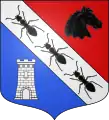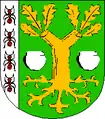
Arms of Multia, Finland, a rare
simple emmet (or ant) in heraldry
simple emmet (or ant) in heraldry
The emmet, also called the pismire, is an heraldic charge in European heraldry, particularly in English and German heraldry, representing historic names for the ant.
Significance
The emmet might be understood as a symbol of hard work and of wisdom, although symbolism in heraldry always has to be approached with skepticism, as the arms might be canting, or the symbolism might not apply in a particular case. In his A Display of Heraldrie (1610), John Guillim of the English College of Arms says:
"By the Emmet or Pismire may be signified a Man of great Labour, Wisdom, and Providence in all his Affairs, and of a pregnant and ready Memory."[1]
Attitude
The emmet is often shown as tergiant, or with his back to the viewer, as seen from above.
Examples
Gallery


 Arms of Brekendorf, in Schleswig-Holstein, Germany
Arms of Brekendorf, in Schleswig-Holstein, Germany.svg.png.webp)
 Arms of the commune of Saint-Maurice-sur-Moselle, France
Arms of the commune of Saint-Maurice-sur-Moselle, France.svg.png.webp) Arms of Sewen, France
Arms of Sewen, France Arms of Marwice, Poland
Arms of Marwice, Poland Arms of Zeschdorf, in Brandenburg, Germany
Arms of Zeschdorf, in Brandenburg, Germany
Notes
Wikimedia Commons has media related to Ants in heraldry.
- ↑ John Guillim, A Display of Heraldry, 1724 edition, p. 202
- ↑ Thomas Robson, The British herald; or, Cabinet of armorial bearings of the nobility & gentry of Great Britain & Ireland, from the earliest to the present time (1830), p. 14
- ↑ William John Monson, Lincolnshire Church Notes 1828–1840 (Lincoln Record Society, 1936), p. 408
This article is issued from Wikipedia. The text is licensed under Creative Commons - Attribution - Sharealike. Additional terms may apply for the media files.